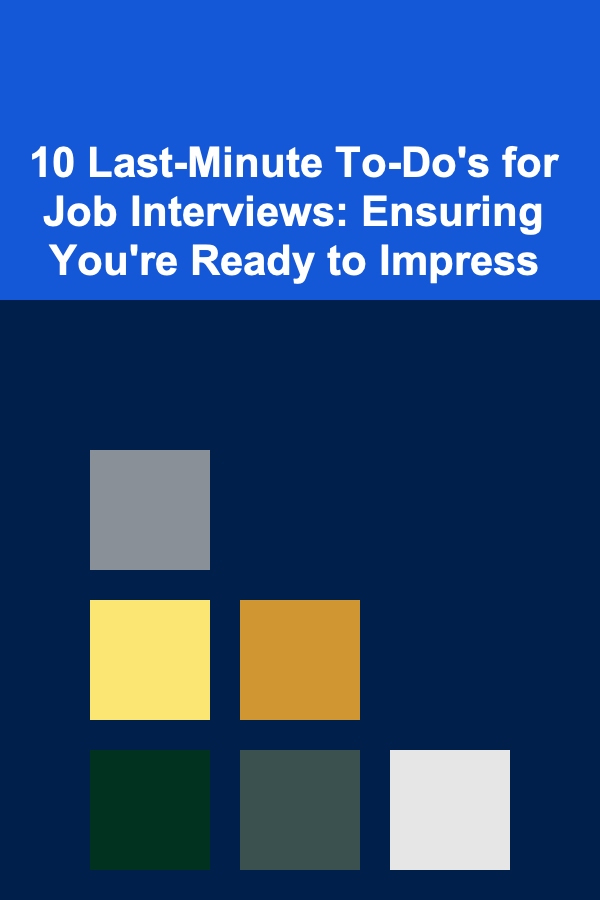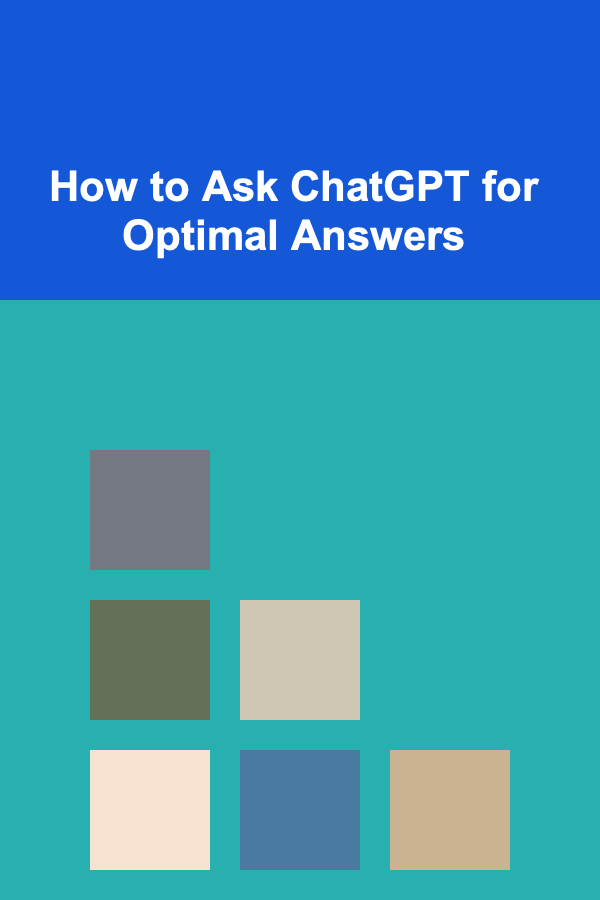
10 Last-Minute To-Do's for Job Interviews: Ensuring You're Ready to Impress
ebook include PDF & Audio bundle (Micro Guide)
$12.99$7.99
Limited Time Offer! Order within the next:

A job interview is one of the most crucial steps in the hiring process. It's your opportunity to showcase your skills, qualifications, and personality, and to prove why you're the best fit for the job. While most of the preparation for a job interview takes place in the days or weeks leading up to the event, there are some critical last-minute to-dos that can ensure you're fully ready to impress your potential employers. Whether it's your first interview or your fiftieth, these tips will help you make a lasting impression and feel confident heading into your interview.
Review the Job Description Thoroughly
Even if you've already studied the job description extensively, it's important to review it one final time before your interview. Pay close attention to key skills, qualifications, and responsibilities that are emphasized in the listing. This will help you tailor your responses and highlight your relevant experiences during the interview.
By re-reading the job description, you can also refresh your memory about the company's specific needs and the role you're applying for. Ensure you understand exactly what the company is looking for in a candidate and prepare to demonstrate how your skills and experiences align with those requirements.
In addition to reviewing the job description, also research the company's values, culture, and mission. This will help you understand the bigger picture and show that you've done your homework, making it easier to align your answers with the company's ethos.
Prepare Your Questions
Job interviews are a two-way street, and asking insightful questions shows that you're engaged and genuinely interested in the company and the role. By asking thoughtful questions, you also get an opportunity to assess whether the job and company are the right fit for you.
Prepare at least three to five questions to ask the interviewer. Some good options might include:
- What are the most important goals for the person in this role during the first six months?
- How would you describe the company culture and work environment?
- What opportunities are there for growth and development within this role?
- Can you tell me more about the team I'd be working with?
Avoid asking questions that are already answered on the company's website or in the job description, as it may give the impression that you haven't done your research.
Practice Your Responses to Common Questions
While you can't predict every question you'll be asked, there are certain common interview questions that you can expect. Take some time to practice your responses to these questions to ensure that you communicate clearly and effectively during the interview.
Some typical questions include:
- "Tell me about yourself."
- "What are your strengths and weaknesses?"
- "Why do you want to work here?"
- "Tell me about a time you faced a challenge at work and how you handled it."
Rehearse your answers out loud, either in front of a mirror, with a friend, or by recording yourself. Pay attention to your tone, body language, and delivery, as these non-verbal cues are just as important as the content of your answers.
It's also a good idea to prepare for behavioral interview questions that require you to share examples of past experiences. The STAR method (Situation, Task, Action, Result) is an excellent framework for answering these types of questions.
Ensure You Have the Necessary Documents
On the day of your interview, make sure you have all the necessary documents organized and ready to go. Depending on the nature of the interview, this may include:
- Several copies of your resume or CV
- Your cover letter (if applicable)
- A list of references
- A portfolio of your work (for creative roles)
- Any certifications or professional qualifications
Having these documents on hand shows that you are prepared and professional. It also ensures that you're ready to provide the interviewer with any materials they may need during the interview.
If you're conducting a virtual interview, double-check that your computer or device is fully charged, and ensure that you have a stable internet connection. Make sure your camera and microphone are working properly, and that you're in a quiet, well-lit location.
Choose Your Outfit Carefully
The clothes you wear to an interview have a significant impact on the impression you make, so it's important to choose your outfit thoughtfully. Consider the company culture and the nature of the position you're applying for when selecting your attire.
For more formal industries, such as finance or law, a suit or professional business attire is appropriate. For creative fields, such as design or marketing, you may opt for business casual attire, but ensure that you still look polished and put-together.
Regardless of the industry, make sure your clothes are clean, well-fitted, and wrinkle-free. Pay attention to personal grooming, such as neat hair, clean nails, and minimal accessories. Dressing appropriately demonstrates professionalism and respect for the company.
Get a Good Night's Sleep
Rest is one of the most important factors in ensuring you're alert and energized during your interview. Aim to get a full night's sleep before the interview day, so you wake up feeling refreshed and ready to perform your best. Being well-rested will help you think clearly, stay focused, and remain calm and composed during the interview.
If you're prone to nerves, relaxation techniques like deep breathing or meditation can help you calm your mind before bed. Try to avoid caffeine or heavy meals in the evening, as these can disrupt your sleep.
Remember that the night before your interview is not the time to cram for the conversation or overthink your responses. A restful sleep will leave you more prepared than an exhausting late-night prep session.
Review Your Online Presence
In today's digital age, employers often review candidates' online profiles as part of the hiring process. Before your interview, take a moment to review your social media presence and ensure that it aligns with the professional image you want to portray.
Check your LinkedIn profile to ensure that it's up to date with your most recent job experience, skills, and accomplishments. If there are any public posts or content that may be viewed negatively by potential employers, consider adjusting your privacy settings or removing them altogether.
While most employers will be focused on your professional achievements, it's important to ensure that any personal online content also reflects your character and values. Keeping your online presence clean and professional can contribute positively to your candidacy.
Review Your Body Language
During the interview, your body language plays a key role in how you are perceived. Non-verbal cues such as eye contact, posture, and facial expressions can convey confidence, enthusiasm, and attentiveness. On the other hand, poor body language can give the impression that you're uninterested, unprepared, or insecure.
To present yourself in the best light:
- Sit up straight and avoid slouching.
- Maintain good eye contact without staring.
- Smile and use hand gestures when appropriate to express enthusiasm.
- Avoid crossing your arms, as it can make you appear defensive.
- Be mindful of nervous habits like fidgeting or tapping your feet.
Good body language will help reinforce your verbal responses and show that you are confident, engaged, and eager to contribute.
Eat a Light, Balanced Meal
Before heading into your interview, have a light meal that provides you with energy without making you feel sluggish or overly full. Avoid heavy or greasy foods, as they can make you feel tired or uncomfortable. A balanced meal with a mix of protein, vegetables, and whole grains can help you feel satisfied and alert.
Also, be mindful of your caffeine intake. While a cup of coffee may help you feel more awake, too much caffeine can make you jittery and anxious, which is the last thing you want during an interview.
Arrive Early (or Log in Early for Virtual Interviews)
Arriving early shows that you're punctual, reliable, and respectful of the interviewer's time. Aim to arrive at least 10--15 minutes before the scheduled start time of the interview. This gives you time to relax, gather your thoughts, and review any notes if needed.
For virtual interviews, ensure that you log in at least 5--10 minutes before the scheduled time to resolve any technical issues. Double-check that your camera, microphone, and lighting are set up properly, and that you're in a quiet, distraction-free environment.
Being punctual, whether in person or online, sets a positive tone for the interview and demonstrates your professionalism.
Conclusion
Last-minute preparation for a job interview is about focusing on the details that will make a big difference in your performance. By following these 10 to-dos, you'll enter the interview room (or virtual meeting) feeling confident, prepared, and ready to impress. Remember that the goal is not only to demonstrate your qualifications but also to show that you're genuinely interested in the company and its culture. With the right mindset and preparation, you'll be one step closer to landing your dream job.
Reading More From Our Other Websites
- [Home Party Planning 101] How to Create a Relaxing Atmosphere for a Stress-Free Party
- [Organization Tip 101] How to Create a Home Inventory from Scratch
- [Home Renovating 101] How to Renovate a Garage into a Workshop
- [Home Maintenance 101] How to Properly Store Small Kitchen Appliances
- [Personal Care Tips 101] How to Get the Best Results from Teeth Whitening Strips in Just One Week
- [Tiny Home Living Tip 101] Best Compact Bathroom Fixtures for Luxury Tiny Home Living
- [Organization Tip 101] How to Use a Planner for Comprehensive Paper Management
- [Organization Tip 101] How to Create a Cozy Reading Nook in Your Bathroom
- [Home Family Activity 101] How to Host a Backyard Picnic for Family Fun
- [Home Pet Care 101] How to Socialize Your Puppy for a Happy Life

How to Ask ChatGPT for Optimal Answers
Read More
How to Create a Warm and Welcoming Lighting Scheme
Read More
How to Create an Efficient Home Office in Small Rooms
Read More
How to Set Up a Seasonal Recipe Book for Easy Reference
Read More
How to Stage Your Home to Highlight Its Unique Features
Read More
How to Understand Customer Psychology for Profit: A Deep Dive into the Mind of the Consumer
Read MoreOther Products

How to Ask ChatGPT for Optimal Answers
Read More
How to Create a Warm and Welcoming Lighting Scheme
Read More
How to Create an Efficient Home Office in Small Rooms
Read More
How to Set Up a Seasonal Recipe Book for Easy Reference
Read More
How to Stage Your Home to Highlight Its Unique Features
Read More